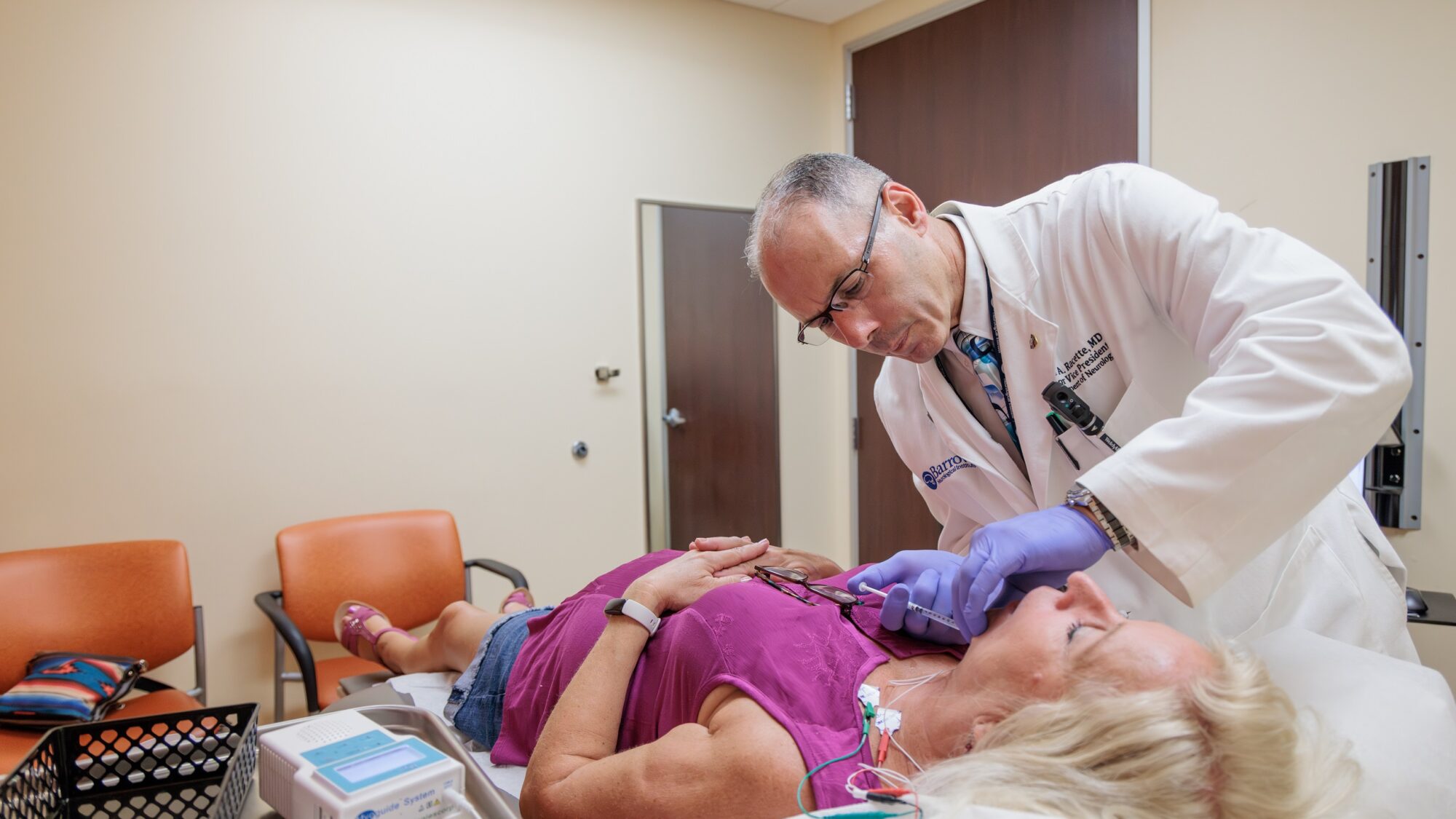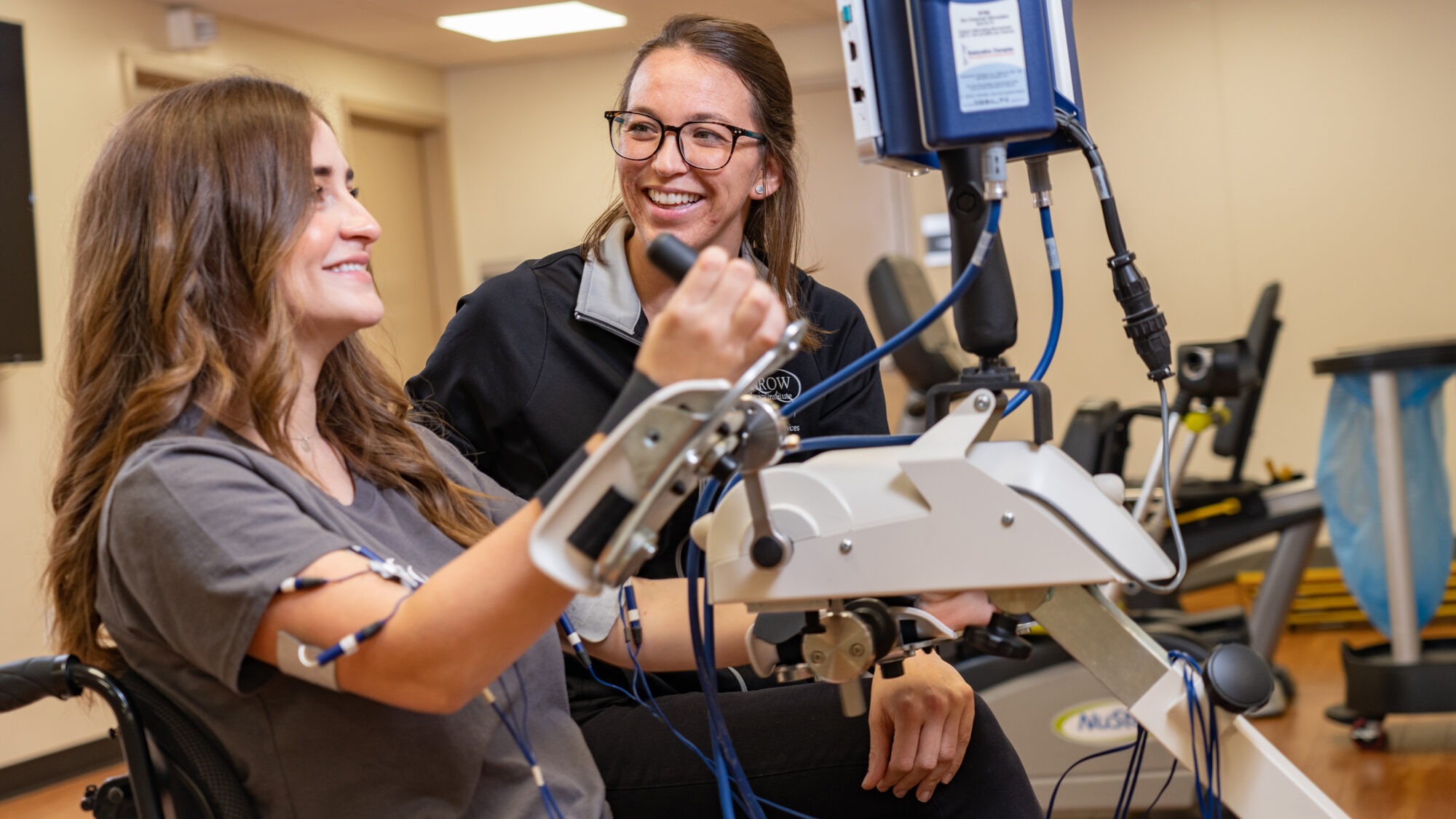
Neurology
Overview
Neurology is a branch of medicine that studies, diagnoses, and treats disorders and diseases of the nervous system.
The nervous system includes the brain, spinal cord, and peripheral nerves, categorized into these two essential parts:
- The central nervous system (CNS): This part of the nervous system includes the brain and the spinal cord and is responsible for processing information, controlling movement, and regulating bodily functions.
- The peripheral nervous system (PNS): This part of the nervous system includes the nerves outside the brain and spinal cord that transmit signals between the CNS and the rest of the body.
Critical to survival, the nervous system works to regulate the following daily functions:
- Cognition and memory: These processes incorporate your body’s ability to think, perceive, remember, reason, and make decisions.
- Movement and coordination: This group represents muscle control, reflexes, and voluntary actions, such as walking, talking, running, or writing.
- Sensation and perception: This category embodies functions like vision, hearing, touch, pain, and balance.
- Autonomic functions: Also known as involuntary functions, these functions include your heartbeat, digestion, breathing, and temperature regulation.
When left untreated, neurological disorders, diseases, and conditions can lead to complications and potentially life-threatening situations.
Why is the field of neurology important?
Neurology is one of the most pivotal medical fields because it focuses on the “command center” that controls every bodily function, from movement and thought to sensation and organ regulation.
The field is a lifeline for millions who suffer from neurological conditions and a driving force in medical research and innovation. Without neurology, the ability to diagnose, treat, and understand brain, spine, and nerve-related diseases would be severely limited.
What’s more, neurology has generated some of the most significant medical advancements in recent years. These same breakthroughs are reshaping the way we understand the brain and nervous system and include:
- Neuroimaging advancements: With more refined neuroimaging techniques, earlier and more accurate diagnoses can occur. These include innovations like positron emission tomography (PET) scans for Alzheimer’s and Parkinson’s disease that detect specific plaques and proteins years before symptoms manifest and ultra-high-field MRI scans that provide exceptional brain detail for the early detection of epilepsy and multiple sclerosis (MS).
- Neurodegenerative disease treatments: New, disease-modifying drugs are providing hope for Alzheimer’s, Parkinson’s disease, and amyotrophic lateral sclerosis (ALS). Moreover, these breakthroughs aren’t just treating symptoms; they’re slowing or modifying the disease process—something previously thought impossible.
- Neuroplasticity research: Neuroplasticity helps “retrain the brain” after an injury, based on our brain’s ability to heal, adapt, and grow throughout our lives. Inspiring neuroplasticity research offers new, unprecedented hope for people with brain injuries, paralysis, and neurodegenerative diseases.
- Gene therapy and neuro-regeneration: Gene therapy is one of the most promising realms in neurology. It targets diseases at a genetic level to correct mutations or restore normal protein production. Current applications include gene editing for Parkinson’s disease and ALS and a one-time gene therapy treatment for spinal muscular atrophy (SMA).
- Brain-computer interfaces (BCIs): BCIs are revolutionary devices that allow people with neurological disorders or paralysis to communicate, move, and control devices with their thoughts. These devices hold the potential to restore movement and communication in paralyzed individuals and foster optimism in those with severe disabilities.
The field of neurology is pushing the boundaries of what’s possible in medicine, and these breakthroughs offer hope for previously untreatable conditions. Ultimately, neurology isimproving lifespans and quality of life by protecting, restoring, and enhancing the most complex system in the body.

Neurological Specialties
A neurologist is a doctor who specializes in diagnosing and treating people with disorders, diseases, or injuries of the central nervous system (CNS) and peripheral nervous system (PNS). These include various conditions affecting a person’s conscious mental activities, feelings and sensations, movements, and more.
Many neurologists further specialize in and work with specific categories of neurological disorders, including the areas below.
Neurologists’ expertise is far-reaching, and neurology has been proven to remedy a long list of symptoms, improve outcomes, and propel neuroscience forward.

Neurorehabilitation for Quality of Life
Neurorehabilitation is also critically important to neurology, as it helps people with neurological conditions regain lost functions and independence. Rehabilitation treatments vary depending on the part of the nervous system that’s been affected and can be provided in an acute care hospital, a rehabilitation hospital, or an outpatient setting.
At Barrow Neurological Institute, our CARF-accredited Neuro-Rehabilitation Center offers inpatient, outpatient, and transitional rehabilitation programs. We also lead the industry in using neuro-robotics. These cutting-edge technologies allow patients to reach unprecedented heights in function and independence.
Common Questions
Am I a good candidate for treatment by a neurologist?
If you have a condition or disease affecting your brain, spine, or peripheral nervous system (PNS), or you’ve experienced a brain, spinal cord, or peripheral nerve injury, you may need to see a neurologist.
Additionally, the following symptoms can warrant a neurologist’s expertise:
- Unexplained pain, sensory changes, numbness, or paralysis
- Chronic headaches or migraines
- Memory problems or cognitive decline
- Uncontrolled movements, tremors, or seizures
- Muscle weakness, numbness, or tingling
- Difficulty with movement, balance, or coordination
- Dizziness, balance issues, or fainting spells
In the event you’re experiencing a medical emergency, please dial 9-1-1.
What can I expect during my appointment with a neurologist?
A first visit to a neurologist typically involves a detailed medical history, a neurological examination, and possibly initial tests. Your neurologist will aim to identify the cause of your symptoms and develop a treatment plan.
First, your neurologist will ask you questions about your symptoms, like:
- What symptoms are you experiencing?
- When did they start?
- Have these symptoms worsened over time?
- What triggers or worsens your symptoms?
Next, depending on your symptoms, they will perform a physical and neurological examination to evaluate your reflexes, muscle strength and coordination, sensory function, cognitive and memory function, and ability to balance and walk. These exams will help your neurologist pinpoint whether your symptoms are related to the brain, spinal cord, or peripheral nerves.
After the exam, the neurologist will explain their initial impression of what could be causing your symptoms. They may suggest a treatment plan, such as medications, physical or occupational therapy, further specialized testing, or referrals to additional specialists. Your neurologist may also order imaging studies, such as an MRI or CT scan, blood tests, or nerve conduction tests, like an electroencephalogram (EEG) or electromyography (EMG) study.
Before your appointment, write down any questions so you can come prepared and use your time best.
What is the difference between neurology and neurosurgery?
While neurologists focus on diagnosing and treating neurological disorders without surgery, neurosurgeons are responsible for surgical procedures on the brain, spine, and peripheral nerves.
A neurologist may refer you to a neurosurgeon if surgery is needed. After surgery, your neurologist will help with the ongoing management of your condition if required. Sometimes, a neurologist and neurosurgeon collaborate on your treatment plan. In fact, both fields often work together for complex diseases like brain and spine tumors, movement disorders, or epilepsy surgery.



